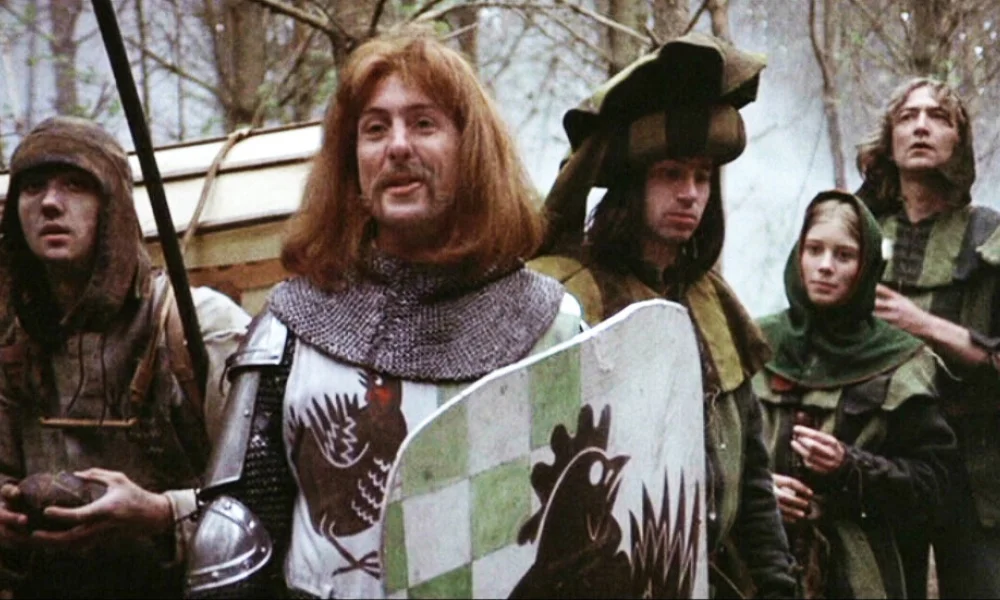'Holy hand grenades!' How the Flashback Film Festival's Holy Grail found its groove
Now in its ninth year, and billed as Canada’s only coast-to-coast film festival, the Flashback Film Fest offers a lineup of classics from Feb. 2-9 – including The Big Lebowski, Drunken Master, Gremlins, Shaun Of The Dead, WarGames, The Terminator and Terminator 2: Judgment Day.
Original-Cin’s Jim Slotek here recalls interviews with Terry Jones about how Monty Python and the Holy Grail came to be.
You know who these guys are...
There’s a shameful past practice in the TV industry going back to the ‘60s called “wiping.” Whole series were practically wiped out on the basis that the blank video tapes were worth more than the shows themselves.
Doctor Who, for example has huge gaps in its history, and certain “lost” episodes – like the recently-screened Power of the Daleks – were pieced together from discovered video supplemented with crude animation.
Comedy history might also have been very different if Monty Python’s Terry Jones hadn’t organized a nighttime ninja raid on the BBC in 1973.
“In those days, the BBC’s policy was to erase what they called ‘light entertainment,’” Jones told me in a 2004 interview at Montreal’s Just For Laughs festival. “They’d keep opera and symphony concerts because they were perceived to have historical value.
“Anyway, we were tipped off by a video editor that they were about to wipe the first series of Monty Python’s Flying Circus. So we smuggled the tapes out of the BBC. It was a risky thing to do, illegal actually. “We re-recorded them on a Phillips VCR – quarter-hour tape cassettes.”
Soon after, the original tapes having been saved from erasure, the BBC found a buyer who started the Python ball rolling in the U.S. (Monty Python’s Flying Circus episodes had already aired on CBC in Canada as early as 1970).
“By serendipity, this fellow Ron Devillier, who ran the (PBS) station in Dallas called them up and asked about the show. They said, ‘We don’t think you’d be interested. They’re not really circuses, you know.’”
Devillier insisted, and Monty Python’s Flying Circus quickly became must-see PBS programming. If there was no Monty Python’s Flying Circus on U.S. TV in 1974, there probably wouldn’t have been a U.S. market for 1975’s Monty Python and the Holy Grail – the troupe’s first foray into non-sketch feature comedy (they’d released the sketch-filled And Now For Something Completely Different in 1971).
Monty Python and the Holy Grail – which screens nationwide next week as part of Cineplex’s Flashback Film Fest – also marked the ascendance within the group of both the erratic Graham Chapman (who played both King Arthur and the title fake messiah in Life of Brian) and Jones, who directed Life Of Brian and co-directed Holy Grail with Terry Gilliam.
Terry Jones in his Circus days
In a later interview with Jones about the posthumous documentary A Liar’s Autobiography: The Untrue Story of Monty Python’s Graham Chapman, Jones said that Chapman was the essential element for the breakout into narrative comedy.
The reason both films worked, Jones said, was that Chapman - as wild an alcoholic and carouser as he was, and ferocious in his openness as an “out” gay man - was the only member of the troupe who was capable of playing it (you should excuse the expression) straight.
Jones said he’d discovered Chapman’s style when he attended a performance of The Cambridge Circus (where Graham and best friend John Cleese were stand-outs). “I couldn’t take my eyes off him,” Jones recalled. “For the life of me, I couldn’t understand what he was doing. John and the others were being funny and acting their hearts out. But Graham was this mysterious figure on the stage, as if he’d just wandered in off the street and was bemused by being there. It was a kind of non-acting.
“And I think that non-acting approach was essential for how he interpreted the role of Arthur in Monty Python and the Holy Grail and Brian in The Life of Brian. He was very much the ‘still center’ around which all this madness revolved.
“He was the one person in the troupe who was charged with the responsibility of taking it all very seriously. Otherwise it wouldn’t have worked.” Jones recalled that Cleese wanted to play Brian at one point. “And we hastily persuaded him not to.”
Chapman didn’t take direction well, sober or not. And in the audiobook memoirs that formed the basis of A Liar’s Autobiography, there were jagged references to Jones as, “the one who made the funny noises.”
“I really don’t know where that came from,” Jones recalled. “But I do remember him grumbling a fair bit when I directed him.”
Most friction, Jones said, could be traced back to school. “The split was always the Cambridge lot and the Oxford lot. Eric (Idle), John and Graham were Cambridge. Michael (Palin) and I went to Oxford. And Terry Gilliam (the lone American) always sided with us.”
Postscript: Graham Chapman died of throat cancer in 1989. Terry Jones – ironically always considered the archivist and “memory” of the group – recently announced he'd been diagnosed with dementia.
The Flashback Film Fest takes place at 27 Cineplex theatres across the country from Feb. 2-9. Tickets are available by clicking here.
Old movies, coming to a theatre near you!



